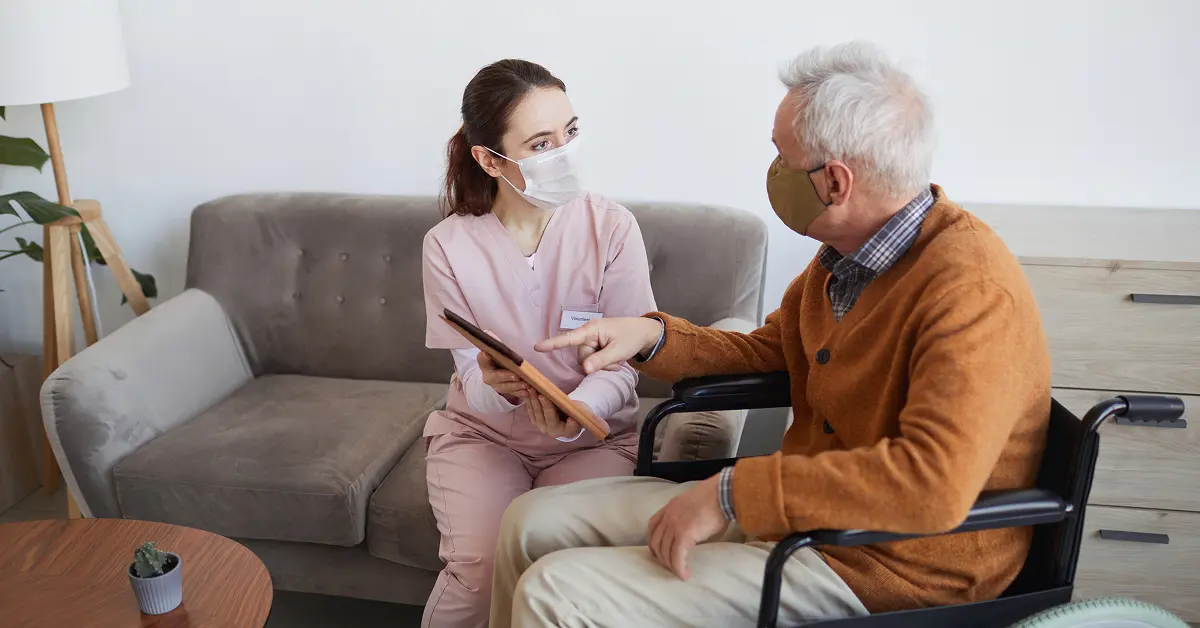Learn how to safely care for a senior with vision or hearing loss in India. Get expert tips on communication, home modifications, assistive devices, and emotional support for elderly parents or loved ones.
Introduction
As our loved ones age, sensory impairments such as vision and hearing loss become increasingly common. According to various health studies, a large percentage of seniors in India above the age of 65 experience some degree of vision or hearing loss. These challenges can severely impact their safety, independence, and emotional well-being if not addressed properly.
Caring for a senior with vision or hearing impairment requires empathy, patience, and proactive planning. Whether you’re a family caregiver or a professional support worker, this guide will provide practical and culturally relevant tips to help ensure the safety and comfort of elderly individuals living with these sensory limitations.
Understanding the Impact of Vision and Hearing Loss in Seniors
Vision Loss:
Common age-related eye conditions include cataracts, glaucoma, macular degeneration, and diabetic retinopathy. These can lead to blurred vision, sensitivity to light, difficulty seeing at night, or even total blindness. Vision loss increases the risk of falls, accidents, and social isolation.
Hearing Loss:
Presbycusis, or age-related hearing loss, often affects seniors gradually. Seniors may have difficulty following conversations, hearing doorbells, or reacting to alarms and phone calls. Untreated hearing loss can lead to miscommunication, frustration, and withdrawal from social interactions.
Prioritise Medical Support
- Schedule Regular Checkups: Annual eye exams and hearing tests help monitor changes and enable early treatment.
- Follow Treatments: Adhere to prescriptions for glasses, eye drops, hearing aids, or surgeries like cataract removal.
- Explore Rehabilitation Services: Vision therapy or auditory training can improve functioning with existing impairments.
Modify the Home for Better Safety
For Vision Impairments:
- Use high-contrast colours on stair edges, door frames, and appliances.
- Install bright, non-glaring lights in key areas.
- Keep floors clutter-free to avoid tripping hazards.
- Label medication and household items in large print or braille.
For Hearing Impairments:
- Install visual alerts like flashing lights for doorbells and alarms.
- Reduce background noise during conversations.
- Use amplified phones or video calling apps.
Communicate Effectively
For Seniors with Vision Loss:
- Always announce yourself before approaching or touching them.
- Describe surroundings and movements clearly.
- Encourage them to use touch for object identification.
For Seniors with Hearing Loss:
- Face the person and maintain eye contact.
- Speak clearly and slowly without shouting.
- Use gestures or write down important information.
Use Assistive Devices
Vision Aids:
- Magnifiers, large-print books, and talking devices.
- Smart assistants like Alexa or Google Home for reminders.
Hearing Aids:
- Modern digital hearing aids with noise reduction.
- Bluetooth devices for clearer communication.
Encourage Independence
- Support daily routines and self-care with adaptive tools.
- Train in safe navigation and use mobility aids.
- Provide talking clocks, colour-coded clothing, etc.
Address Emotional and Social Needs
- Encourage seniors to express their emotions freely.
- Connect them with local support groups and NGOs.
- Promote hobbies like audiobooks, music, or gardening.
Train the Caregiver or Family Members
- Take a basic caregiver training course if possible.
- Learn emergency communication techniques.
- Foster independence with patience and respect.
Explore Local Resources in India
- ADIP Scheme: Offers free or subsidised assistive devices.
- Helplines: Available in many Indian cities for elder support.
- Senior Citizen Clubs: Help promote social interaction and regular activity.
Conclusion
Caring for a senior with vision or hearing loss is both a challenge and an opportunity. It calls for compassion, education, and adaptation. By making thoughtful changes to the environment, using assistive technology, and offering emotional support, we can empower our elderly loved ones to live safely, confidently, and with dignity.
Remember, sensory loss does not have to mean the loss of quality of life. With the right care, tools, and mindset, you can help your loved one lead a fulfilling life even in the face of these challenges.
Contents
- Introduction
- Understanding the Impact of Vision and Hearing Loss in Seniors
- Prioritise Medical Support
- Modify the Home for Better Safety
- Communicate Effectively
- Use Assistive Devices
- Encourage Independence
- Address Emotional and Social Needs
- Train the Caregiver or Family Members
- Explore Local Resources in India
- Conclusion
Our 24*7 services
Latest Posts
- What Is Respite Care and Why Is It Important
- Affordable home care for senior citizens in India
- Caring for Seniors with Dementia or Alzheimer's at Home
- Senior Caregiving A Guide for Every Family
- How to Write a Caregiver Resume That Gets You Hired
- How Care After Hospital Discharge Speeds Up Recovery at Home
- How to Get Home Health Care for Seniors Through Medicare
- What Does a Senior Citizen Caregiver Really Do at Home
- How to Care for Elderly Parents with Alzheimer’s or Dementia
- How to Get 24-Hour Care for Seniors at Home



